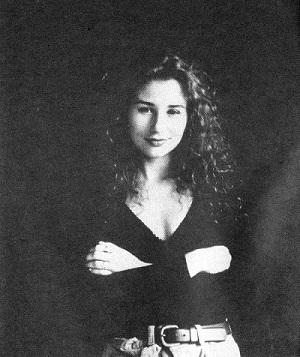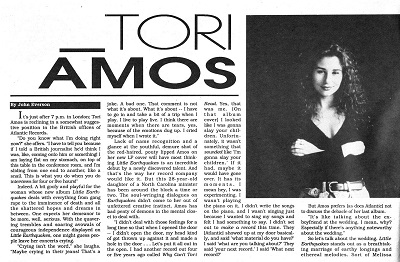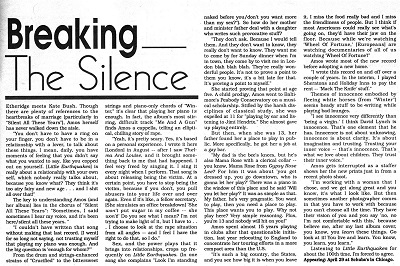|

songs | interviews | photos | tours | boots | press releases | timeline
Illinois Entertainer (US)
March 1992

TORI AMOS
Breaking The Silence
By John Everson
It's just after 7 p.m. in London; Tori Amos is reclining in a somewhat suggestive position in the British offices of Atlantic Records.
"Do you know what I'm doing right now?" she offers. "I have to tell you because if I told a British journalist he'd think I was, like, coming onto him or something! I am laying flat on my stomach, on top of this table in the conference room, and I'm sliding from one end to another, like a snail. This is what you do when you do interviews for four or five hours!"
Indeed. A bit goofy and playful for the woman whose new album Little Earthquakes deals with everything from gang rape to the imminence of death and all the shattered hopes and dreams in between. One expects her demeanor to be more, well, serious. With the quavering trembles and soaring avowals of courageous independence displayed on Little Earthquakes, one might guess people leave her concerts crying.
"Crying isn't the word," she laughs. "Maybe crying in their jeans! That's a joke. A bad one. That comment is not what it's about. What it's about -- I have to go in and take a bit of a trip when I play. I live to play live. I think there are moments when there are tears, yes, because of the emotions dug up. I cried myself when I wrote it."
Lack of name recognition and a glance at the youthful, demure shot of the red-haired, pouty lipped Amos on her new LP cover will have most thinking Little Earthquakes is an incredible debut by a newly discovered talent. And that's the way her record company would like it. But this 28-year-old daughter of a North Carolina minister has been around the block a time or two. The sould-wringing dialogues on Earthquakes didn't come to her out of unfettered creative instinct. Amos has had plenty of demons in the mental closet to deal with.
"I didn't deal with those feelings for a long time so that when I opened the door -- I didn't open the door, my head kind of got thrown up against it and made a hole in the door . . . Let's put it all out in the open. I had another record out four or five years ago called Y Kant Tori Read. Yes, that was me. [On that album cover] I looked like I was gonna slay your children. Unfortunately, it wasn't something that sounded like 'I'm gonna slay your children.' If it had, maybe it would have gone over. It has its moments. I mean hey, I was experimenting. I wasn't playing the piano on it. I didn't write the songs on the piano, and I wasn't singing just because I wanted to sing my songs and felt I had something to say. I didn't set out to make a record this time. They [Atlantic] showed up at my door basically, and said, 'What material do you have?' I said, 'What are you talking about?' They said, 'Your next record.' I said, 'What next record?'"
But Amos prefers [as does Atlantic] not to discuss the debacle of her last album.
"It's like talking about the ex-boyfriend at the wedding. I mean, why? Especially if there's anything noteworthy about the wedding."
So let's talk about the wedding. Little Earthquakes stands out as a breathtaking marriage of earthy longings and ethereal melodies. Sort of Melissa Etheridge meets Kate Bush. Though there are plenty of references to the heartbreaks of marriage (particularly in "Silent All These Years"), Amos herself has never walked down the aisle.
"You don't have to have a ring on your finger, you don't have to be in a relationship with a lover, to talk about these things. I mean, daily, you have moments of feeling that you didn't say what you wanted to say, like you copped out on yourself. [Little Earthquakes] is really about a relationship with your own self, which nobody really talks about, because you know what? They think it's too airy fairy and new age . . . and I shit all over that!"
The key to understanding Amos (and her album) lies in the chorus of "Silent All These Years": "Sometimes, I said sometimes I hear my voice, and it's been here / silent all these years."
"I couldn't have written that song without making that last record. [I went] for so long not saying, not trusting myself that playing my piano was enough. And the big question is, 'Enough for whom?'"
From the drum and strings-enhanced strains of "Crucify" to the bittersweet strings and piano-only chords of "Winter," it's clear that playing her piano is enough. In fact, the album's most stirring, difficult "Me and a Gun" finds Amos a cappella, telling an elliptical, chilling story of rape.
"Yeah, it's pretty scary. Yes, its based on a personal experience. I wrote it here [London] in August -- after I saw Thelma and Louise, and it brought something back to me that had happened. I feel very freed by singing it. I sing it every night when I perform. That song is about releasing being the victim. At a certain point, you have to stop being the victim, because if you don't, you pull abusers into your life over and over again. Even if it's like, a fellow secretary. [She simulates an office breakdown] 'She won't put sugar in my cofee -- she won't!' Do you see what I mean? I'm not trying to make light of it, but I have to . . . I choose to look at the rape situation from all angles -- and I feel I have the right to do that, so I do."
Sex, and the power plays that it brings into relationships, crops up frequently on Little Earthquakes. (In one song she complains "Look I'm standing naked before you / don't you want more than my sex?"). So how do her mother and minister father deal with a daughter who writes such provocative stuff?
"They don't ask. Because I would tell them. And they don't want to know, they really don't want to know. They want me to come by for Sunday dinner when I'm in town, they come by to visit me in London blah blah blah. They're really wonderful people. It's not to prove a point to them you know, it's a bit late for that. It's proving a point to myself."
She started proving that point at age five. A child prodigy, Amos went to Baltimore's Peabody Conservatory on a musical scholarship. Stifled by the harsh disciplines of classical study, she was expelled at 11 for "playing by ear and listening to Jimi Hendrix." She almost gave up playing entirely.
But then, when she was 13, her father found her a place to play in public. More specifically, he got her a job at a gay bar.
"My dad is the bee's knees, but he's also Mama Rose with a clerical collar -- you know, Mama Rose from Gypsy Rose Lee? For him it was about 'you get dressed up, you go downtown, who is gonna let her play?' There was a piano in the window of this place and he said, 'Will you let her play?' It was as simple as that. My father, he's very pragmatic. You want to play, then you need a place to play. This place wants you to play. Why not play here? Very simple reasoning. Plus, you're 13 and nobody will hit on you!"
Amos spent almost 15 years playing in clubs after that questionable initiation, last year relocating to England to concentrate her touring efforts in a more compact area than the U.S.
"It's such a big country, the States, and you see how big it is when you leave it. I miss the food really bad and I miss the friendliness of people. But I think if most Americans could really see what's going on, they'd have their jaw on the floor. Because while we're watching 'Wheel of Fortune,' [Europeans] are watching documentaries of all of us watching 'Wheel of Fortune'!"
Amos wrote most of the new record before adopting a new home.
"I wrote this record on and off over a couple of years. In the interim, I played Sheratons and Holiday Inns to pay the rent -- 'Mack the Knife' stuff."
Themes of innocence embodied by fleeting white horses (from "Winter") seems heady stuff to be writing while playing bad lounges.
"I see innocence very differently than 'being a virgin.' I think David Lynch is innocence. That's one element that he has. Innocence is not about unknowing, innocence is about clarity. It's about imagination and trusting. Trusting your inner voice -- that's innocence. That's what we love about children. They trust their inner voice."
Amos gets interrupted as a staffer shows her the new prints just in from a recent photo shoot.
"I'm working with a woman that I chose, and we get along great and you know, it's what I look like. But then sometimes another photographer comes in that you have to work with because you can't choose all the time. They have their vision of you and you say 'no, no I'm not comfortable with this,' because believe me, after my last album cover, you know, you learn these things. Go look at it! You live and learn. You know, you learn, you learn."
Listening to Little Earthquakes for about the 100th time, I'm forced to agree.
Appearing: April 29 at Schuba's in Chicago.
original article


t o r i p h o r i a
tori amos digital archive
yessaid.com
|